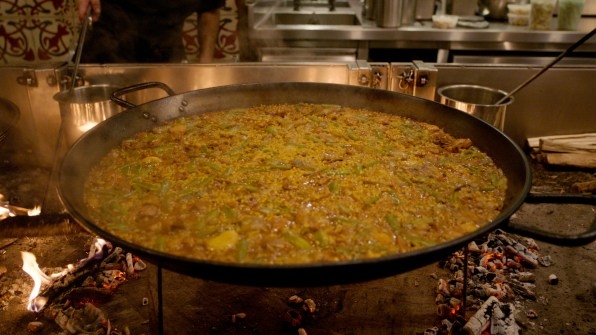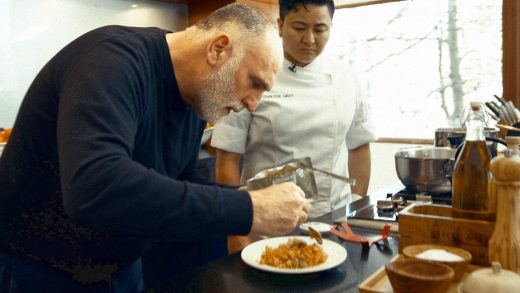From Ukrainians to astronauts on the ISS, José Andrés is feeding anyone in need—and well
“There will always be somebody ready to do whatever it takes to feed their fellow citizens,” says Spanish chef José Andrés. That’s been his mission since 2010, when he launched his nonprofit organization World Central Kitchen (WCK) to cook hot meals for victims of the Haitian earthquake. He later brought the organization to storm-ravaged Houston and Puerto Rico. Over the past couple of years, WCK also served more than 40 million meals to people whose lives and livelihoods were affected by the pandemic.

One day after the Russian invasion of Ukraine, WCK mobilized to address the war, setting up in eight locations along the Polish border with Ukraine. Within weeks, the nonprofit had established partnerships with restaurants and food trucks to distribute meals to people at border crossings, shelters, train stations, and other locations across the region, including Ukraine, Poland, Hungary, Moldova, and Romania. It’s also focused on getting bulk produce and supplies to partner restaurants inside Ukraine to alleviate strained supply chains. The organization is now serving some 180,000 daily meals to people displaced by the war. It has also mobilized restaurants and chefs outside the region to support its efforts in Ukraine by hosting #ChefsForUkraine fundraising dinners.
At the same time, Andrés has been working to bring his food into space. In early April, two dishes designed by his company, ThinkFoodGroup, will launch with a multinational crew headed to the International Space Station, on a mission put together by commercial space company Axiom Space. Andrés, who got involved through his friendship with veteran astronaut Michael López-Alegría, commander for the upcoming mission, says that he has long dreamed of making meals for astronauts—and even going to space himself.
Fast Company talked with him about working in a war zone, designing meals for astronauts, and the power of paella.
Fast Company: How is your work in Ukraine different from what you’ve done in other crisis zones?
José Andrés: We’re a young NGO. We’ve never been in an active war zone. We’ve been in situations of instability, like Venezuela or Haiti, but this is a true war scenario. We began working in the countries surrounding Ukraine, except for Russia. We began in Poland, but very quickly we sent teams to Hungary and Romania. I think we’re doing 180,000 meals a day, mainly because more and more refugees keep leaving Ukraine. We see that the need inside [Ukraine also] keeps increasing.
Everybody talks about the three million refugees, but nobody talks about the other two to three million, if not more, that are displaced inside Ukraine. So there are at least six million people whose lives have been destroyed. Plus the other millions who are in cities where there’s bombing and shelling. So we are talking about probably 10-, 12-, 13 million people whose lives are not the same anymore. This is a major event.
FC: What’s the security situation for an NGO like World Central Kitchen?
JA: Obviously, there is a lot of security advice. Sometimes it sounds more [like something] from a James Bond movie than real life, but you take them seriously. Some foreign Russian assets try to distort facts to create mayhem, but you still have to take all security advice seriously. Because of the security risk, we have to send food to different cities using different protocols and systems. We’re figuring out how to navigate checkpoints: It’s quicker to get through when security recognizes that you are feeding people.
FC: How are you actually getting food to people?
JA: I’ve found that there will always be somebody ready to do whatever it takes to feed their fellow citizens. We’ve been supporting people [in local food businesses] with money, with assets, with equipment, and with food. We are supporting bakeries and distributors. We have been serving venison that people have hunted—and lots of soups because it’s so cold and people need warmth.

FC: You’re also trying to feed people in space. How did your collaboration with Axiom Space come about?
JA: I’ve been talking to NASA now for a long time. I had NASA people come to my main office meet with me and my team a few times in the last 10 or 12 years. At Axiom, we ended up working with a lot of people from the NASA team we used to talk to. I am friends with [astronaut] Michael López-Alegría–he is also Spanish–who is leading the group to the [International Space Station] with Axiom. When I created WCK, I always said, “We send doctors and nurses to help the sick, so why don’t we send cooks to feed people who need it?” I always wanted to push those boundaries. The truth is that we will be on Mars or Jupiter or whatever one day. We have all this technology to go to another planet but we don’t have the will on earth to make our planet better.
FC: How did you decide what dishes to serve on the ISS?
I mean: Spanish chef, Spanish astronaut. For me, we had to do one of the most iconic Spanish dishes, paella. It’s a rice dish–we made one with chicken and mushrooms– and there are rice dishes around the world. In India you have biryani, in Brazil and China you have rice dishes, too. So, it felt kind of international. We also made secreto de cerdo con pisto, an ibérico pork dish with tomatoes, onions, eggplant, and peppers, because I wanted to showcase another Spanish dish. But I now realize that one of the astronauts can’t eat pork! The most important one to me is the paella.

FC: What were the R&D challenges of designing a dish that can travel into space?
JA: Well, first of all, we did this all in the middle of a pandemic. A lot of it was less science and more trial and error. I had my team members helping me with this one, and they tested over 100 iterations of the paella. We had to create a meal where all of the ingredients could be put in an opaque bag, and put on a metal shelf to get warmed up for half an hour before being consumed. We had to figure out how liquid would reduce in the bag to make sure the paella wasn’t too soft or too hard and the moisture level was perfect. We had to figure out the quantities of each raw ingredient, how and how they would cook under pressure. We tested it in Houston and then in our offices and in our homes trying to recreate the conditions.
FC: There’s now a rift between the ISS’s two main partners, the United States and Russia. Russia’s space chief even raised the idea of Russia leading the ISS into an uncontrolled deorbit in a series of tweets criticizing U.S. sanctions against Russia. Has this affected your work?
JA: This meal will be shared by all Axiom Mission 1 astronauts. Paella is a communal dish, and everybody in the Ax-1 crew will share it. I don’t know that this is the beginning of the peace process, but it’s good for people to eat together and see each other across a table.
FC: Do you plan on making more dishes to be consumed in space down the line?
JA: I hope so. Critics will say that with so much hunger on this planet, why spend money to go to space? I say we can do both. More and more people are going to be going to space. It’s important to have good people working on these things.
FC: Do you plan on going to space?
JA: You’re going to laugh at me, but I’ve been getting into shape over the last two or three years. Somebody told me everybody has a 1% chance of going up there. I mean, I’ve been down in a submarine into the deep sea. I’m a cook who barely graduated [from high school]. Anything is possible. I started cooking rice dishes with my father when I was a kid, and now I am making the same dish for a crew going to the International Space Station.
Fast Company , Read Full Story
(31)



